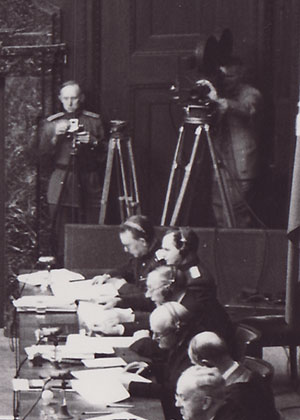Nuremberg Principles
UNITED NATIONS, 31 Dec 2018
Schulberg Productions – TRANSCEND Media Service

Portions of the Nuremberg trial were filmed with movie cameras operated by Army Signal Corps cameramen.
On November 21, 1947, one year after the end of the first Nuremberg trial (IMT), the United Nations passed General Assembly Resolution 177 in order to codify the so-called “Nuremberg Principles.” The original language reads:
177 (II). Formulation of the principles recognized in the Charter of the Nürnberg Tribunal and in the judgment of the Tribunal.
The General Assembly decides to entrust the formulation of the principles of international law recognized in the charter of the Nürnberg Tribunal and in the judgment of the Tribunal to the International Law Commission, the members of which will, in accordance with resolution 174 (II), be elected at the next session of the General Assembly, and direct the Commission to:
(a) Formulate the principles of international law recognized in the Charter of the Nürnberg Tribunal and in the judgment of the Tribunal and,
(b) Prepare a draft code of offences against the peace and security of mankind, indicating clearly the place to be accorded to the principles meantioned in sub-paragraph (a) above.
In order to fulfill this mandate, the International Law Commission (which had been created under UN Resolution 174) duly codified seven principles, listed below, and adopted them on July 29, 1950.
The “Nuremberg Principles” are:
- Any person who commits an act which constitutes a crime under international law is responsible therefor and liable to punishment.
- The fact that internal law does not impose a penalty for an act which constitutes a crime under international law does not relieve the person who committed the act from responsibility under international law.
- The fact that a person who committed an act which constitutes a crime under international law acted as Head of State or responsible Government official does not relieve him from responsibility under international law.
- The fact that a person acted pursuant to order of his Government or of a superior does not relieve him from responsibility under international law, provided a moral choice was in fact possible to him.
- Any person charged with a crime under international law has the right to a fair trial on the facts and law.
- The crimes hereinafter set out are punishable as crimes under international law:
a) Crimes against peace
b) War crimes
c) Crimes against humanity - Complicity in the commission of a crime against peace, a war crime, or a crime against humanity as set forth in Principle 6 is a crime under international law.
_____________________________________________
Submitted by TRANSCEND member Satoshi Ashikaga.
Go to Original – nurembergfilm.org
DISCLAIMER: The statements, views and opinions expressed in pieces republished here are solely those of the authors and do not necessarily represent those of TMS. In accordance with title 17 U.S.C. section 107, this material is distributed without profit to those who have expressed a prior interest in receiving the included information for research and educational purposes. TMS has no affiliation whatsoever with the originator of this article nor is TMS endorsed or sponsored by the originator. “GO TO ORIGINAL” links are provided as a convenience to our readers and allow for verification of authenticity. However, as originating pages are often updated by their originating host sites, the versions posted may not match the versions our readers view when clicking the “GO TO ORIGINAL” links. This site contains copyrighted material the use of which has not always been specifically authorized by the copyright owner. We are making such material available in our efforts to advance understanding of environmental, political, human rights, economic, democracy, scientific, and social justice issues, etc. We believe this constitutes a ‘fair use’ of any such copyrighted material as provided for in section 107 of the US Copyright Law. In accordance with Title 17 U.S.C. Section 107, the material on this site is distributed without profit to those who have expressed a prior interest in receiving the included information for research and educational purposes. For more information go to: http://www.law.cornell.edu/uscode/17/107.shtml. If you wish to use copyrighted material from this site for purposes of your own that go beyond ‘fair use’, you must obtain permission from the copyright owner.